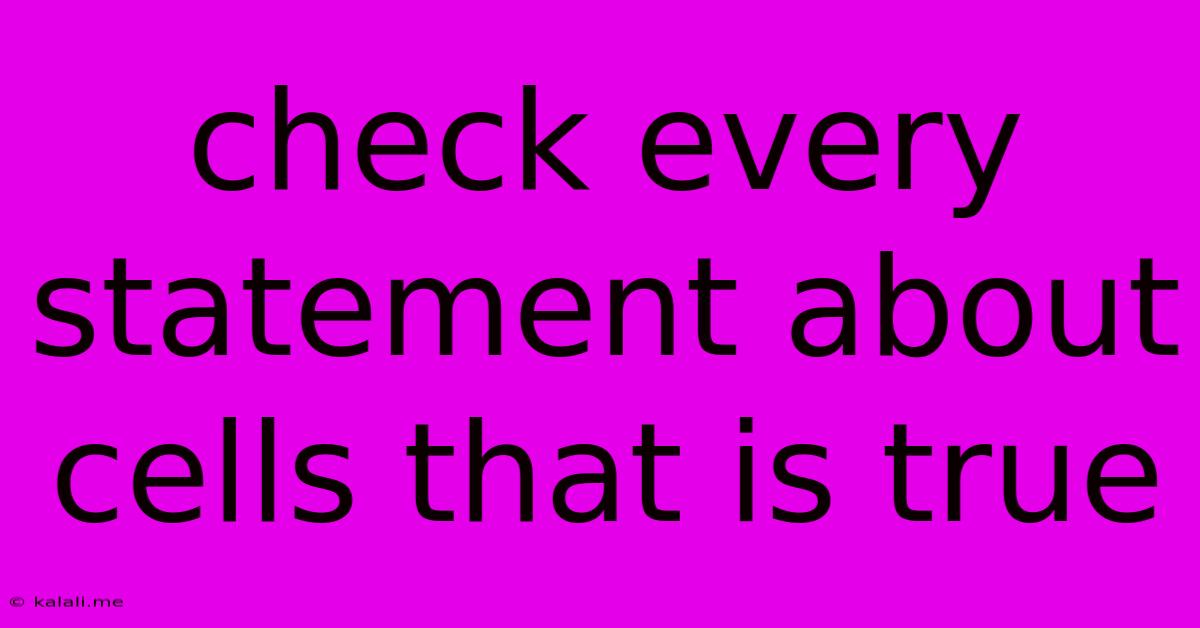Check Every Statement About Cells That Is True
Kalali
Jun 14, 2025 · 3 min read

Table of Contents
Checking the Facts: Separating Cell Biology Truth from Fiction
Understanding cells is fundamental to grasping biology. This article will delve into common statements about cells, verifying their accuracy and clarifying misconceptions. We'll explore the structure, function, and processes within these fundamental building blocks of life, ensuring a comprehensive understanding.
Cells are the basic unit of life; this is a cornerstone of biology. But beyond this simple statement, numerous details about their structure and function exist, some accurate and others not. This article will examine several assertions and determine their truthfulness. We'll also explore related concepts like cellular respiration, cell division, and the differences between prokaryotic and eukaryotic cells.
Key Characteristics of Cells: Fact or Fiction?
Let's examine some common statements regarding cells and dissect their accuracy:
Statement 1: All cells contain a nucleus.
Verdict: False. While many cells do contain a nucleus (eukaryotic cells), prokaryotic cells (like bacteria and archaea) lack a membrane-bound nucleus. Their genetic material is located in a region called the nucleoid. This crucial difference underscores the diversity within the cellular world.
Statement 2: Cellular respiration occurs in the mitochondria.
Verdict: True. Mitochondria are often called the "powerhouses" of the cell. They are the sites of cellular respiration, a process that converts nutrients into usable energy in the form of ATP (adenosine triphosphate). This energy fuels various cellular processes. The intricate process involves the Krebs cycle and the electron transport chain, both integral to mitochondrial function.
Statement 3: Plant cells contain chloroplasts and a cell wall.
Verdict: True. Plant cells are distinguished by the presence of chloroplasts, which carry out photosynthesis, converting light energy into chemical energy. They also possess a rigid cell wall, providing structural support and protection, unlike animal cells. The cell wall is mainly composed of cellulose.
Statement 4: All cells reproduce through mitosis.
Verdict: False. Mitosis is a type of cell division that results in two identical daughter cells. While this is a common form of reproduction for somatic cells, other forms exist, such as meiosis (producing gametes) and binary fission (in prokaryotes). The reproductive process varies significantly across cell types.
Statement 5: The cell membrane regulates the passage of substances into and out of the cell.
Verdict: True. The cell membrane, also known as the plasma membrane, is a selectively permeable barrier. It regulates what enters and exits the cell through various mechanisms, including diffusion, osmosis, and active transport. This control maintains the cell's internal environment, crucial for its survival.
Statement 6: Ribosomes are responsible for protein synthesis.
Verdict: True. Ribosomes are the protein synthesis machinery of the cell. They translate the genetic code from messenger RNA (mRNA) into polypeptide chains, which fold into functional proteins. This fundamental process is essential for all cellular functions.
Statement 7: DNA is found only in the nucleus.
Verdict: False. While the majority of a eukaryotic cell's DNA is located within the nucleus, a small amount is also found in mitochondria (mitochondrial DNA) and chloroplasts (in plant cells) – showcasing the endosymbiotic theory.
Conclusion: A Deeper Understanding of Cellular Biology
By critically examining these common statements, we've gained a deeper understanding of the intricacies of cell biology. Remembering the exceptions and nuances is as important as understanding the fundamental principles. This nuanced approach will improve your comprehension of this vital area of biological study. Further exploration of specialized cell types and processes will further enhance this understanding.
Latest Posts
Latest Posts
-
Difference Between Mixture And Solution Examples
Jun 15, 2025
-
What Is The Antonym Of Inferior
Jun 15, 2025
-
When An Electron Is Removed The Atom Gets A
Jun 15, 2025
-
Moment Of Inertia Of A Thin Ring
Jun 15, 2025
-
How Are Plants Different From Algae
Jun 15, 2025
Related Post
Thank you for visiting our website which covers about Check Every Statement About Cells That Is True . We hope the information provided has been useful to you. Feel free to contact us if you have any questions or need further assistance. See you next time and don't miss to bookmark.